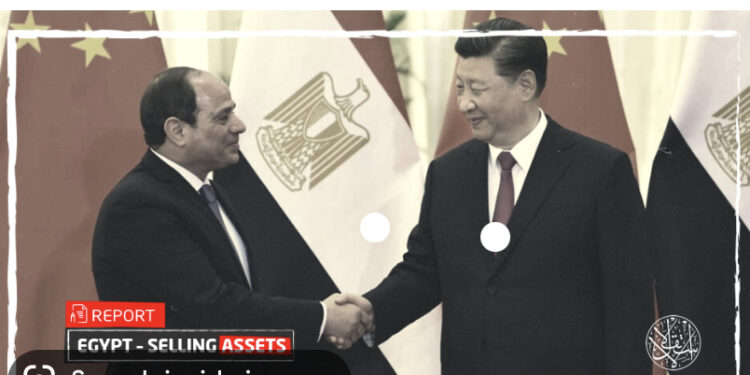Amid rising external debt, Egypt planning to swap its strategic assets with China, reported The Singapore Post. A local news website Arabi21.com has reported that Cairo is in discussion with Beijing for swapping a part of the USD 8 billion loan it took from China for properties like ports and airports owned by it.
It is believed that Egypt’s move to swap its debt with China for strategic assets could be a part of its plan to disinvest state-backed assets, reported The Singapore Post. According to Arabi 21.com, Cairo has also offered to sell land, properties, and holdings in state-backed companies to the UAE, Saudi Arabia, Qatar, and Kuwait to help reduce the debt it owed to several countries.
The Egypt-based news website said the process of discussion between Egypt and China had begun in August 2022 when an Egyptian delegation went to Switzerland to meet with a Chinese delegation to negotiate the swapping of Chinese debt on Cairo for strategic assets.
The Egyptian business weekly outlet said the El-Sisi government finalised 66 mergers and acquisitions in the country in 2022 and the majority of these were military deals.
As per Arabi21.com, negotiations between Cairo and Beijing started after Egyptian President Abdel Fattah El-Sisi supported the “One-China policy.” Sisi gave the statement after the US House of Representatives Speaker Nancy Pelosi’s visit to Taiwan in the first week of August last year, reported The Singapore Post.
Supporting the “One China” policy, he had said, “We do not want more global crises that may affect us all…In our foreign policy, we have a constant in our policy that does not change, and we are always keen to be supportive of regional and international stability,” he said. However, the Chinese Foreign Ministry denied any knowledge about it, reported The Singapore Post.
Notably, China is Egypt’s fourth-biggest creditor with USD 8 billion in outstanding debt or about 5 per cent of Cairo’s total external debt. Over the past decade, external debt has piled on Egypt. By the end of March 2022, the North African country’s total external debt stood at about USD 158 billion, said a World Bank report.
Moreover, Egypt’s economic condition has fallen to record lows and inflation has soared above 20 per cent. Tens of millions of people, as per various media reports, are struggling to put food on their tables even as the private sector is grappling with foreign currency shortages, reported The Singapore Post.
Last year, the crisis-ridden Arabian country turned towards the IMF for the fourth time in six years for a bailout package. The IMF promised Cairo a USD 3 billion rescue package, though attached with heavy conditions.
It called for critical structural reforms, including withdrawal of the state from assets it owned and gradual reduction in the military’s footprint across the economy.
The Bretton Woods institution also asked Egypt to shift to a flexible exchange rate regime and slow implementation of public investment projects, reported The Singapore Post. The IMF has warned that Egypt would face a financing gap of around USD 17billion over the next four years. By selling its state-backed assets, Egypt wants to mop up USD 2 billion.
In addition to this, it is gearing up to secure USD 1.1 billion from the World Bank, USD 300 million from the African Development Bank and USD 300 million from the Arab Monetary Fund, reported The Singapore Post. It is pertinent to note that Sri Lanka too swapped its debt with China for their strategic assets.
In 2017, cash-strapped Sri Lanka handed over the southern port of Hambantota to China Merchants Port Holdings on a 99-year lease after Colombo could not pay back USD 1.12 billion as the funding capital debt to the Chinese company.
Since then, Sri Lanka is ingloriously quoted as a victim of China’s debt-trap diplomacy.










Discussion about this post